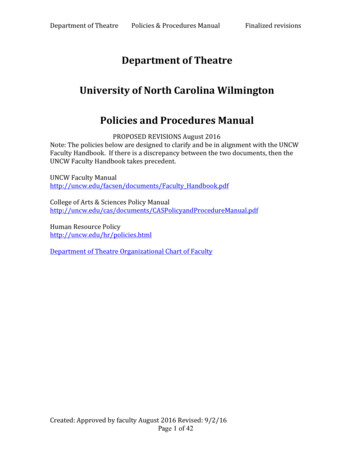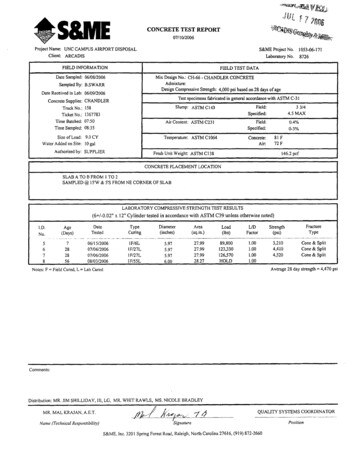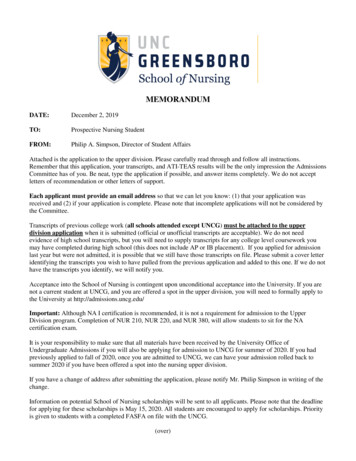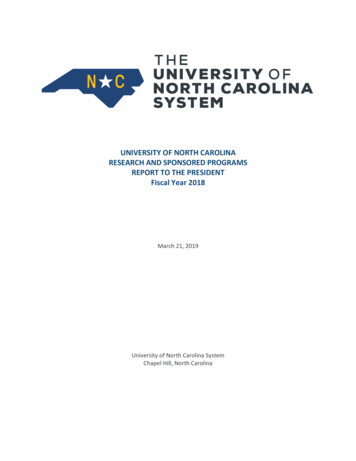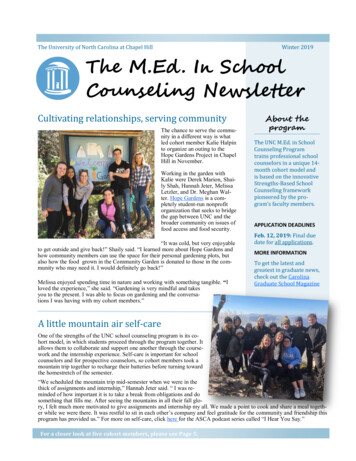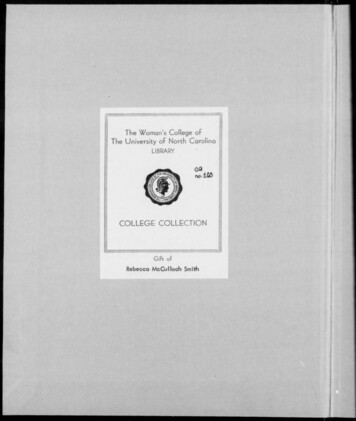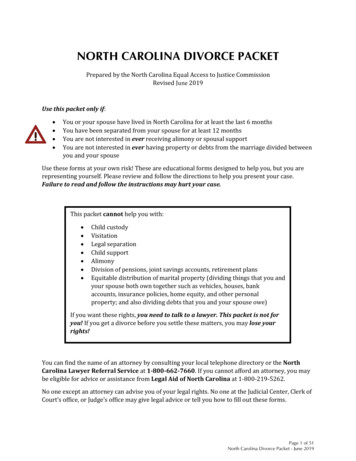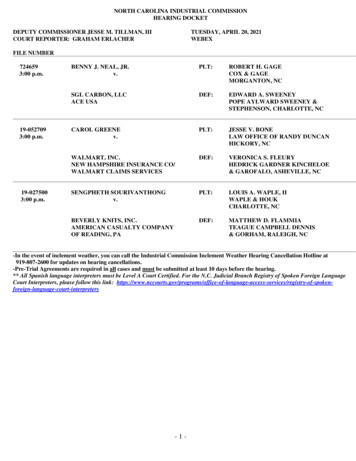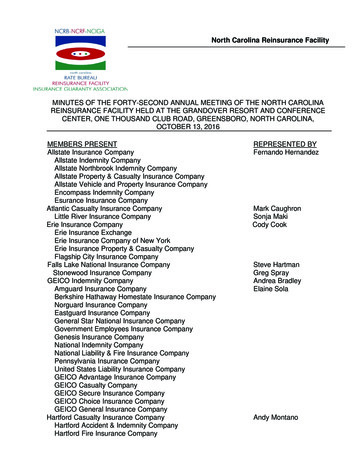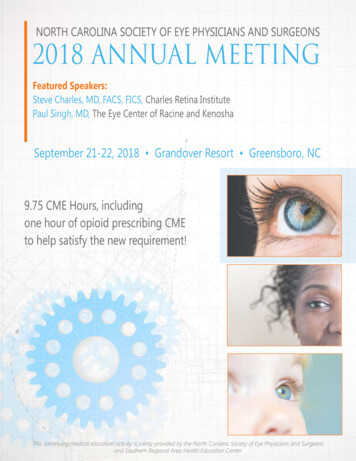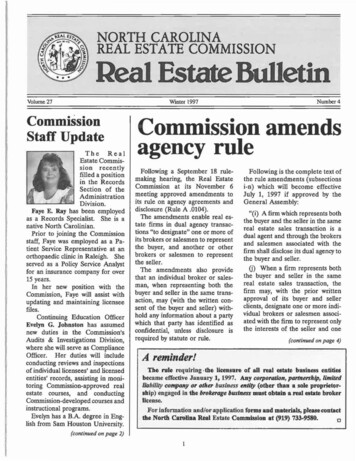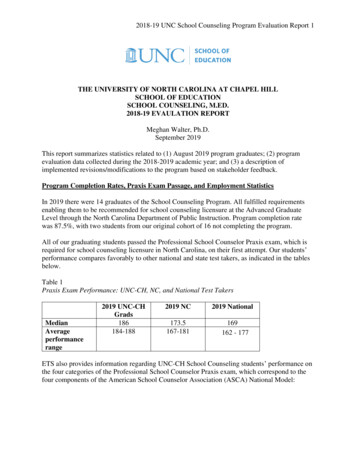
Transcription
2018-19 UNC School Counseling Program Evaluation Report 1THE UNIVERSITY OF NORTH CAROLINA AT CHAPEL HILLSCHOOL OF EDUCATIONSCHOOL COUNSELING, M.ED.2018-19 EVAULATION REPORTMeghan Walter, Ph.D.September 2019This report summarizes statistics related to (1) August 2019 program graduates; (2) programevaluation data collected during the 2018-2019 academic year; and (3) a description ofimplemented revisions/modifications to the program based on stakeholder feedback.Program Completion Rates, Praxis Exam Passage, and Employment StatisticsIn 2019 there were 14 graduates of the School Counseling Program. All fulfilled requirementsenabling them to be recommended for school counseling licensure at the Advanced GraduateLevel through the North Carolina Department of Public Instruction. Program completion ratewas 87.5%, with two students from our original cohort of 16 not completing the program.All of our graduating students passed the Professional School Counselor Praxis exam, which isrequired for school counseling licensure in North Carolina, on their first attempt. Our students’performance compares favorably to other national and state test takers, as indicated in the tablesbelow.Table 1Praxis Exam Performance: UNC-CH, NC, and National Test TakersMedianAverageperformancerange2019 UNC-CHGrads186184-1882019 NC173.5167-1812019 National169162 - 177ETS also provides information regarding UNC-CH School Counseling students’ performance onthe four categories of the Professional School Counselor Praxis exam, which correspond to thefour components of the American School Counselor Association (ASCA) National Model:
2018-19 UNC School Counseling Program Evaluation Report 2Table 2UNC-CH, NC, and National Test Takers, percentage of items correct in each category of ASCANational 19 UNC-CH90%90%86%92%2019 North Carolina83%81%76%72%2019 National79%78%74%75%In addition to the Praxis exam, nine of our 14 students voluntarily elected to take the NationalCounselor Examination (NCE) in preparation for their planned applications for the LicensedProfessional Counselor Associate (LPCA) credential following graduation. The NCE testscandidates on all eight of the content areas outlined by the Council for Accreditation ofCounseling and Related Educational Programs (CACREP). All nine UNC-CH students passedthis exam on their first attempt. Our students’ 100% pass rate compares favorably to the nationalpass rate of 90.6%. The mean score of UNC-CH students on the NCE exam was 116.9, whichwas higher than the mean score of test takers nationally (N 4382, M 104.9).Graduates of the UNC School Counseling program continue to meet the academic, career, andsocial/emotional needs of K-12 students. Of the 14 students who graduated in August 2019,100% have already committed to a specific position in school counseling or a relatedprofessional area. Of the 14 graduates, 13 indicated as of August 2019 that they will beemployed during the 2019-2020 school year as school counselors, and one will be employed asan elementary school teacher in South Carolina. Of the 13 graduates working as schoolcounselors, 9 will be employed in North Carolina, one in Colorado, two in Georgia, and one inIllinois. Across the K-12 levels, there are seven graduates employed in high schools; one in amiddle school; and five in elementary schools.2019 Graduates' Employment for 2019-20113school counselingteacher
2018-19 UNC School Counseling Program Evaluation Report 3School of Education Program ReviewIn March 2019, the School Counseling M.Ed. program was one of a sub-set of programs in theUNC-CH School of Education which was reviewed by a team of external reviewers. This teamreviewed programs according to seven different dimensions, including: mission, curriculum,faculty, students, leadership and administration, future, and self-study. The UNC SchoolCounseling program garnered no concerns from the site visit team but rather only accolades.Specifically, the team noted, “This seems like a successful program that should be continued andexpanded.”Constituent SurveysSurveys were sent electronically to the following four stakeholder groups: (1) current students(August 2019 graduates); (2) alumni of the 2018 graduating cohort; (3) employers of 2018graduates; and (4) internship site supervisors of current students (August 2019 graduates). Allsurvey recipients were asked to rate student and alumni on counseling knowledge and skillsrelated to the 2016 CACREP standards.Overall, current students, alumni, employers, and site supervisors hold positive perceptions ofour program, as demonstrated in the following table (1 poor; 2 fair; 3 good; 4 excellent):Overall Perceptions of the UNC School mniSite SupervisorsThe following sections provide an analysis of the data collected from each of the fourstakeholder groups.Current Students (August 2019 Graduates) Exit Survey
2018-19 UNC School Counseling Program Evaluation Report 4A questionnaire requesting evaluative data about the school counseling program was sent viaemail in July 2019 to all 14 of the August 2019 graduates in the program. This questionnaire alsosolicited information concerning the students’ internship experiences, permanent contactinformation, employment, and elective courses. Fourteen of the 14 students completed thesurvey, yielding a response rate of 100%. Respondents were asked to rate themselves on 17skills/characteristics, as they relate to their abilities as school counselors, using a four-pointLikert-type scale (1 poor; 2 fair; 3 good; 4 excellent). The 2019 student mean rating ofthe overall training received in the program was very positive (M 3.64).Table 3 depicts student ratings on the quantitative survey items related to counseling skillsacquired during the program.Table 3Student Survey Item RatingsSurvey ItemUnderstanding of the school counseling profession and ethical practice(role, responsibilities, etc.)Ability to implement a strengths-based, ASCA model schoolcounseling program and demonstrate ethical practiceUnderstanding of the cultural context of counseling relationships,issues, and trends in a multicultural societyAbility to counsel and advocate for diverse groups in the schoolcontextUnderstanding of the nature and needs of persons of all developmentallevelsUnderstanding of and the ability to promote academic developmentAbility to promote the personal and social development of students andbuild protective factors in the school environmentUnderstanding of and ability to promote career development andpostsecondary access and successAbility to act as a leader in the school and communityUnderstanding of the counseling processAbility to conduct individual and group counselingUnderstanding of group counseling approachesAbility to collaborate and consult with other stakeholders in the schooland communityUnderstanding of assessment, research and program evaluationAbility to conduct and interpret a variety of appropriate assessmentsAbility to conduct research to improve the school counseling 90.630.593.000.673.073.142.790.700.520.67On average, the highest-rated quantitative items by students were: understanding of the culturalcontext of counseling relationships, issues, and trends in a multicultural society (M 3.64, SD 0.47); understanding of the school counseling profession and ethical practice (M 3.57, SD 0.49); and understanding of the counseling process (M 3.57, SD 0.49).
2018-19 UNC School Counseling Program Evaluation Report 5On average, the lowest-rated quantitative items by students were: ability to collaborate andconsult with other stakeholders in the school and community (M 3.00, SD 0.67) and ability toconduct research to improve the school counseling program (M 2.79, SD 0.67).Program strengths, as indicated by the students, included: the cohort model; the accelerated, 14month program; the year-long internship in one school and integrated coursework; andknowledgeable and available professors, and the program’s emphasis on the solution-focusedapproach, strengths, and ASCA National Model. The main areas for improvement for theprogram as noted by the students included: more focus on additional counseling theories otherthan Solution-focused; more emphasis on student self-care and wellness; more frequent site visitsfrom UNC supervisors; more transparency and implementation of student feedback andsuggestions; and more consistency across practicum and internship sections with regard toprofessor expectations and requirements.Alumni SurveyA survey requesting evaluative data about the school counseling program was sent via email toall 2018 graduates of the program (N 15). A total of 12 graduates completed the survey,yielding a response rate of 80%. Using a four-point Likert scale (1 poor; 2 fair; 3 good; 4 excellent), respondents were asked to rate themselves on 17 skills/characteristics as they relate totheir abilities as school counselors. The 2018 graduates’ mean rating of the overall trainingreceived in the program was “good” (M 3.08, SD 0.63).Table 4 depicts alumni ratings on the quantitative survey items related to counseling skillsacquired during the program.Table 4Alumni Survey Item RatingsSurvey ItemUnderstanding of the school counseling profession and ethical practice(role, responsibilities, etc.)Ability to implement a strengths based, ASCA model schoolcounseling program and demonstrate ethical practiceUnderstanding of the cultural context of counseling relationships,issues, and trends in a multicultural societyAbility to counsel and advocate for diverse groups in the schoolcontextUnderstanding of the nature and needs of persons of all developmentallevelsUnderstanding of and the ability to promote academic developmentAbility to promote the personal and social development of students andbuild protective factors in the school environmentUnderstanding of and ability to promote career development andpostsecondary access and successAbility to act as a leader in the school and 90.903.500.653.420.643.500.503.420.64
2018-19 UNC School Counseling Program Evaluation Report 6Understanding of the counseling processAbility to conduct individual and group counselingUnderstanding of group counseling approachesAbility to collaborate and consult with other stakeholders in the schooland communityUnderstanding of assessment, research and program evaluationAbility to conduct and interpret a variety of appropriate assessmentsAbility to conduct research to improve the school counseling 70.710.600.80On average, the highest-rated quantitative items by 2018 alumni were: understanding of thecultural context of counseling relationships, issues, and trends in a multicultural society (M 3.67, SD 0.62); and ability to collaborate and consult with other stakeholders in the school andcommunity (M 3.67, SD 0.62).On average, the lowest-rated quantitative items by 2018 alumni were: Ability to conduct andinterpret a variety of appropriate assessments (M 2.75, SD 0 .60); and understanding of groupcounseling approaches (M 2.89; SD 0.74).Graduates were also asked to provide feedback on program strengths and areas for growth.Program strengths noted by 2018 alumni included: The length (14 month) of the program and the year-long internship in one school The cohort model The strengths-based focus of the program and use of ASCA model Relevant content and applied assignments with emphasis on the academic development course Integration of internship and academics, providing opportunity for practical application Excellent reputation of UniversityAreas for growth included: More support from professors More intentionality in the selection and assignment of internship sites/supervisors Improved communication between professors and students More consistency in terms of university supervision practicesAlumni were also requested to provide suggestions for improving the school counselingprogram. Suggestions included: more cross-level experiences; improved communication byprofessors of student expectations; more information on special education and mental health;more information on theories other than SFBC.Employer SurveyTo obtain feedback on the quality of the performance of our 2018 graduates and to improve thetraining and education of our students, 2018 alumni were sent a link to an electronic surveywhich they were requested to forward to their employers/supervisors. Of the 15 alumni whoreceived the email with the link, five of their supervisors/principals completed the survey,yielding a response rate of 33%. Using a four-point Likert scale (1 poor; 2 fair; 3 good; 4
2018-19 UNC School Counseling Program Evaluation Report 7excellent), employers/supervisors were asked to rate the 2018 graduates on 17 skills as theyrelate to the graduates’ positions as school counselors. The employer mean rating (M 4.00) ofoverall competence as a school counselor reflected extremely positively on the program. Inaddition, employers were asked to rate, on a scale of 1-10 (1 extremely unlikely, 10 extremely likely) how likely they were to recommend a colleague to hire a graduate of theprogram; the employer mean rating was 9.2.Table 5 depicts employer ratings on the quantitative survey items related to employers’perception of the counseling knowledge and skills exhibited by program graduates.Table 5Employer Survey Item RatingsSurvey ItemUnderstanding of the school counseling profession and ethical practice(role, responsibilities, etc.)Ability to implement a strengths-based, ASCA model schoolcounseling program and demonstrate ethical practiceUnderstanding of the cultural context of counseling relationships,issues, and trends in a multicultural societyAbility to counsel and advocate for diverse groups in the schoolcontextUnderstanding of the nature and needs of persons of all developmentallevelsUnderstanding of and the ability to promote academic developmentAbility to promote the personal and social development of students andbuild protective factors in the school environmentUnderstanding of and ability to promote career development andpostsecondary access and successAbility to act as a leader in the school and communityUnderstanding of the counseling processAbility to conduct individual and group counselingUnderstanding of group counseling approachesAbility to collaborate and consult with other stakeholders in the schooland communityUnderstanding of assessment, research and program evaluationAbility to conduct and interpret a variety of appropriate assessmentsAbility to conduct research to improve the school counseling programDemonstrates the ability to use evidence-based strategies and .803.803.800.490.400.400.40Employers mean ratings ranged from 4.00 – 3.60, with the lowest item being: understanding ofassessment, research and program evaluation (M 3.60, SD 0.49).As with program graduates, employers were also asked to provide feedback on programstrengths and areas for growth. Positive comments provided by employers included: “Ourcounselor is exactly what we need in our school environment, we love her!”; “We love (The
2018-19 UNC School Counseling Program Evaluation Report 8program graduate)!” Suggestions included: providing more training on conducting effectiveguidance lessons with more peer interaction, and trying to match students to internship sites thatare more like the kinds of schools they would like to eventually work in.Site Supervisor SurveyA survey was sent via email to the site supervisors of the 14 graduate students who completedour program in 2019. This was done to obtain feedback on how the preparation of schoolcounselors may be improved. Of the 14 surveys distributed to site supervisors, 14 werecompleted, yielding a response rate of 100%. Site supervisors were asked to rate the students on17 skills/characteristics as they related to the students’ positions as school counselor internsusing a four point Likert-type scale (1 poor; 2 fair; 3 good; 4 excellent). The mean ratingprovided by site supervisors with regard the level of training and support they received to act assite supervisors was 3.50 (4.00).The site supervisor mean rating of their level of satisfaction with the program was very high, asindicated on a rating scale of 1-10, with 10 being the highest (M 9.4). Site supervisors werealso asked to rate on a scale of 1 to 10 (1 not likely at all; 10 very likely) how likely theywould be to recommend a colleague to supervise a graduate of this program; on average,respondents rated themselves very likely to do so (M 9.46).Table 6 depicts site supervisor ratings on the quantitative survey items related to supervisors’perceptions of the counseling knowledge and skills exhibited by program graduates.Table 6Site Supervisor Survey Item RatingsSurvey ItemUnderstanding of the school counseling profession and ethical practice(role, responsibilities, etc.)Ability to implement a strengths-based, ASCA model schoolcounseling program and demonstrate ethical practiceUnderstanding of the cultural context of counseling relationships,issues, and trends in a multicultural societyAbility to counsel and advocate for diverse groups in the schoolcontextUnderstanding of the nature and needs of persons of all developmentallevelsUnderstanding of and the ability to promote academic developmentAbility to promote the personal and social development of students andbuild protective factors in the school environmentUnderstanding of and ability to promote career development andpostsecondary access and successAbility to act as a leader in the school and communityUnderstanding of the counseling processAbility to conduct individual and group 0.48
2018-19 UNC School Counseling Program Evaluation Report 9Understanding of group counseling approachesAbility to collaborate and consult with other stakeholders in the schooland communityUnderstanding of assessment, research and program evaluationAbility to conduct and interpret a variety of appropriate assessmentsAbility to conduct research to improve the school counseling programDemonstrates the ability to use evidence based strategies and .620.48Site supervisors’ responses ranged from 3.86 – 3.38. The highest-rated quantitative item by sitesupervisors was: understanding of the school counseling profession and ethical practice (M 3.75, SD 0.43); ability to conduct individual and group counseling (M 3.86, SD 0.35). Thelowest-rated quantitative item by site supervisors was: ability to conduct research to improve theschool counseling program (M 3.38, SD 0.62).We also asked site supervisors to share the overall strengths of the program as well as areas forgrowth. Program strengths as stated by site supervisors included: Student assignments provide a good variety of experiences for the intern. Constructive, consistent feedback to graduate students, communication The amount of time in the field it is great! The balanced approach of year long internship with ongoing courses. Ability to work within a school all year - seeing all the aspects of the calendar andexpectations; rubrics for counseling help with a student who may need more help withstudents/family interactions It is very effective for the internship to last through the academic year versus being onlyone semester. I believe greater learning and growth can take place within this model.Specifically, it allows students to learn skil
2018-19 UNC School Counseling Program Evaluation Report 5 On average, the lowest-rated quantitative items by students were: ability to collaborate and consult with other stakeholders in the school and community (M 3.00, SD 0.67) and ability to conduct research to improve the
